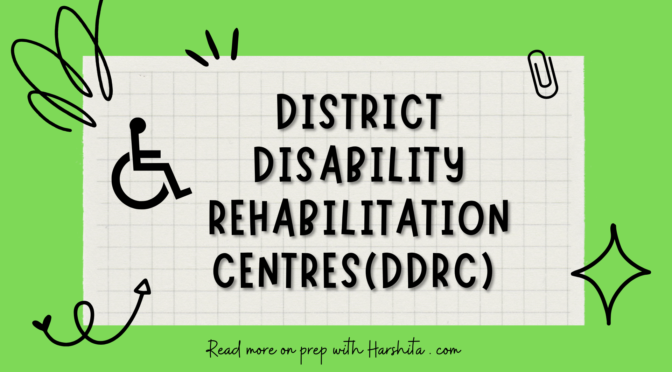A District Disability Rehabilitation Centers(DDRCs) is a specialized facility that provides comprehensive rehabilitation services to individuals with disabilities at the district level. These centers are typically established by the government or non-governmental organizations to ensure that people with disabilities have access to essential rehabilitation services in their local communities.
Here are some key details about District Disability Rehabilitation Centers:
- Purpose: The primary purpose of a DDRC is to provide rehabilitation services to individuals with disabilities, enabling them to enhance their functioning, independence, and overall quality of life. The center aims to address the physical, psychological, social, and vocational needs of people with disabilities.
- Services: DDRCs offer a range of services to cater to the diverse needs of individuals with disabilities. These services may include:
a. Assessment and Evaluation: Comprehensive assessments are conducted to determine the specific needs, abilities, and limitations of individuals with disabilities. This helps in formulating appropriate rehabilitation plans.
b. Therapy Services: DDRCs typically provide various types of therapies, such as physiotherapy, occupational therapy, speech and language therapy, and psychological therapy. These therapies aim to improve physical, cognitive, communication, and psychosocial functioning.
c. Assistive Devices and Technology: DDRCs may provide assistive devices, such as wheelchairs, crutches, hearing aids, communication aids, and other assistive technologies. These devices help individuals with disabilities to overcome barriers and improve their independence.
d. Training and Skill Development: DDRCs often offer training programs to enhance the skills and capabilities of individuals with disabilities. This may include vocational training, life skills training, and education programs tailored to their specific needs.
e. Counseling and Guidance: Emotional and psychological support is provided to individuals with disabilities and their families through counseling services. Guidance on social integration, education, employment, and independent living is also offered.f. Community Outreach: DDRCs often engage in community awareness programs, advocacy, and outreach activities to promote disability rights, inclusion, and create a more inclusive society. - Staff: DDRCs are staffed by a multidisciplinary team of professionals who specialize in different areas of disability rehabilitation. This may include doctors, physiotherapists, occupational therapists, speech and language therapists, psychologists, social workers, vocational trainers, and support staff.
- Collaboration: DDRCs typically collaborate with various stakeholders, including government agencies, non-governmental organizations, local communities, and other service providers. This collaboration ensures a coordinated approach to disability rehabilitation and facilitates the referral of individuals with disabilities to appropriate services.
- Accessibility: DDRCs strive to ensure accessibility for individuals with disabilities. Facilities are designed to accommodate different types of disabilities, with features such as ramps, accessible toilets, and appropriate signage. Efforts are made to create a barrier-free environment that enables easy access for all.
- Funding and Affordability: The funding for DDRCs may come from government sources, non-governmental organizations, charitable donations, or a combination of these. Some services provided at DDRCs may be subsidized or offered free of charge to ensure affordability for individuals with disabilities, particularly those from economically disadvantaged backgrounds.
District Disability Rehabilitation Centers play a crucial role in providing essential rehabilitation services to individuals with disabilities at the district level. They serve as a local resource for comprehensive support, helping individuals with disabilities to overcome challenges, improve their functional abilities, and lead more fulfilling lives.
Also Visit : Prep with Harshita

Also Read : PWD act 1995


Rst
Uma das melhores opções para os fãs do Spaceman é o Betano Cassino. Afinal, a marca não se resume em uma das melhores casas de apostas online. Isso porque também oferece uma plataforma de jogos de casinos online de alta qualidade. Ajuste os valores quer quer apostar no Spaceman clicando nos botões disponíveis na tela de jogo, como na imagem abaixo. Nas apostas do jogo Spaceman, você pode escolher um determinado número de rodadas a serem jogadas automaticamente. Uma das melhores opções para os fãs do Spaceman é o Betano Cassino. Afinal, a marca não se resume em uma das melhores casas de apostas online. Isso porque também oferece uma plataforma de jogos de casinos online de alta qualidade. A plataforma é conhecida por sua interface intuitiva, uma ampla variedade de esportes e um cassino online repleto de opções.
https://gettogether.community/profile/312305/
A gama de apostas no site testado varia desde uma aposta mínima de $ £ €0.10 por ronda até um máximo de $ £ €200 por ronda. O Astronaut convida os jogadores para uma jornada no espaço profundo e recolher joias preciosas. A gama de apostas no site testado varia desde uma aposta mínima de $ £ €0.10 por ronda até um máximo de $ £ €200 por ronda. A gama de apostas no site testado varia desde uma aposta mínima de $ £ €0.10 por ronda até um máximo de $ £ €200 por ronda. Überprüfen Sie Ihren Ordner “Spam” bzw. “Promotions” oder klicken Sie auf die unten befindliche Schaltfläche. Der Link läuft in 72 Stunden ab. O Astronaut convida os jogadores para uma jornada no espaço profundo e recolher joias preciosas. A gama de apostas no site testado varia desde uma aposta mínima de $ £ €0.10 por ronda até um máximo de $ £ €200 por ronda.